Navigate the significance of beeves in biblical texts to uncover ancient wealth and sacrificial secrets that still intrigue today.
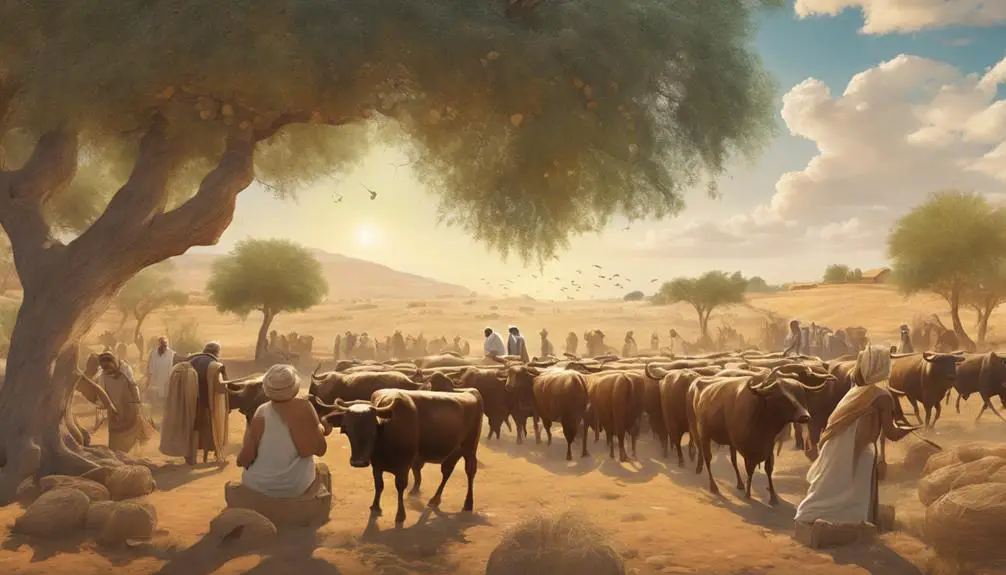
What Are Beeves in the Bible
In the ancient context of the Bible, beeves stand in stark contrast to the more commonly referenced sheep and goats, pointing to a broader spectrum of wealth and sacrificial practices. As you explore the historical and symbolic significance of beeves, you'll uncover layers of societal implications that resonate beyond mere livestock.
Beeves, essentially cattle, played a pivotal role in sacrificial rituals, symbolizing abundance and prosperity. Their inclusion in biblical texts offers a window into the economic and religious life of the times. Let's embark on a journey to understand the multifaceted role of beeves, which might just change your perspective on biblical wealth and worship.
Key Takeaways
- Beeves in the Bible symbolize wealth, power, and divine favor.
- Owning beeves was crucial for economic growth and social standing in biblical societies.
- Beeves were central in sacrificial rituals and had specific dietary laws.
- The management and ownership of beeves influenced community dynamics and social hierarchy.
Understanding 'Beeves
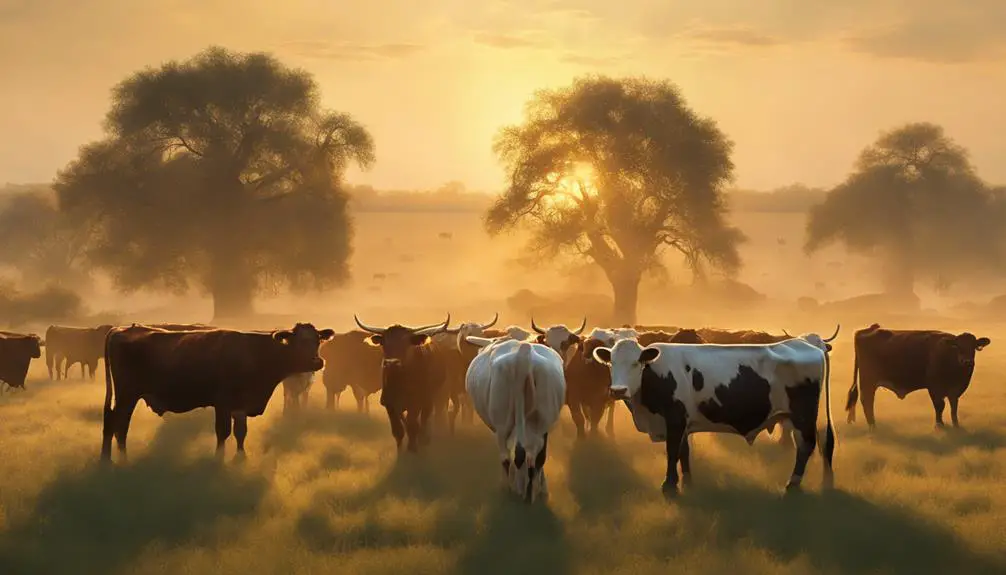
In exploring the term 'beeves' within biblical texts, you uncover that it specifically refers to plural cattle, shedding light on ancient agricultural practices and economic systems. The beeves definition, while straightforward at a glance, carries significant weight in understanding the socio-economic backdrop of the times depicted in these texts. As you delve deeper, you'll find that the translation nuances of 'beeves' reveal much about the priorities and livelihoods of ancient communities.
Biblical references to beeves often signify wealth, prosperity, and sometimes, sacrificial offerings, highlighting their value beyond mere livestock. These references aren't merely incidental; they serve as a window into the economic structures and daily life of the periods in question. The translation nuances come into play when considering the original Hebrew and Greek texts. The term used for 'beeves' in various translations can differ, affecting interpretation and understanding of the text. Such nuances underscore the importance of context in biblical translation and the need for careful analysis to grasp the full meaning.
Moreover, the translation of 'beeves' into English from ancient languages is a fascinating process, involving choices that reflect both linguistic precision and cultural understanding. Scholars must navigate these waters with care, ensuring that modern readers grasp the significance of beeves in the biblical world. This process illuminates the intricacies of biblical language and the depth of meaning that can be conveyed in a single term, offering you a richer appreciation of the biblical narrative and its connection to historical realities.
Historical Context
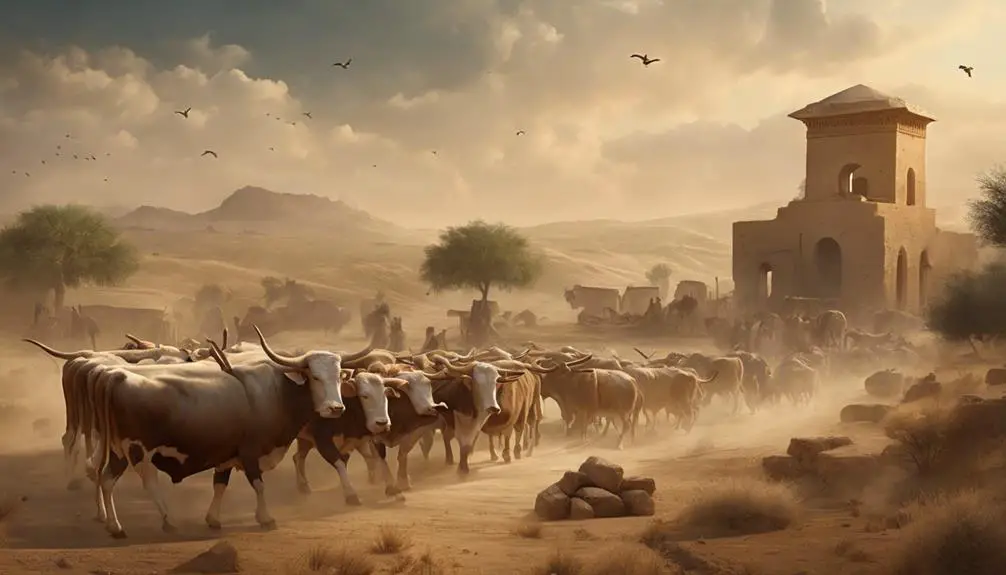
Understanding the historical context of beeves in biblical times requires a deep dive into the agricultural and economic landscapes that shaped ancient societies. You'll find that the role of beeves, or cattle, extends far beyond mere sustenance, intertwining with societal structure, wealth, and even religious practices. The agricultural practices of the time were meticulously developed to suit the arid and semi-arid regions where these societies flourished.
Aspect |
Impact on Beeves |
|---|---|
Agriculture |
Central to sustenance and economic stability, requiring careful breeding and herding techniques. |
Economy |
Beeves were a symbol of wealth and were often used as currency or in trade, reflecting their high value. |
Religious Practices |
Sacrificial rites often involved beeves, signifying their importance in spiritual and communal life. |
Translation Variations |
Different translations of ancient texts reveal nuanced understandings of the term "beeves," indicating the depth of their role. |
Geography |
Adaptation to local environments influenced agricultural practices and the significance of beeves in daily life. |
These factors combined to place beeves at the heart of ancient societies, making them pivotal to understanding the biblical context. The translation variations you encounter are not merely linguistic differences but reflect the multifaceted roles that beeves played in these communities. As you delve deeper, it becomes clear that the significance of beeves transcends the literal, shaping economic, religious, and social fabrics of ancient life.
Symbolism of Beeves
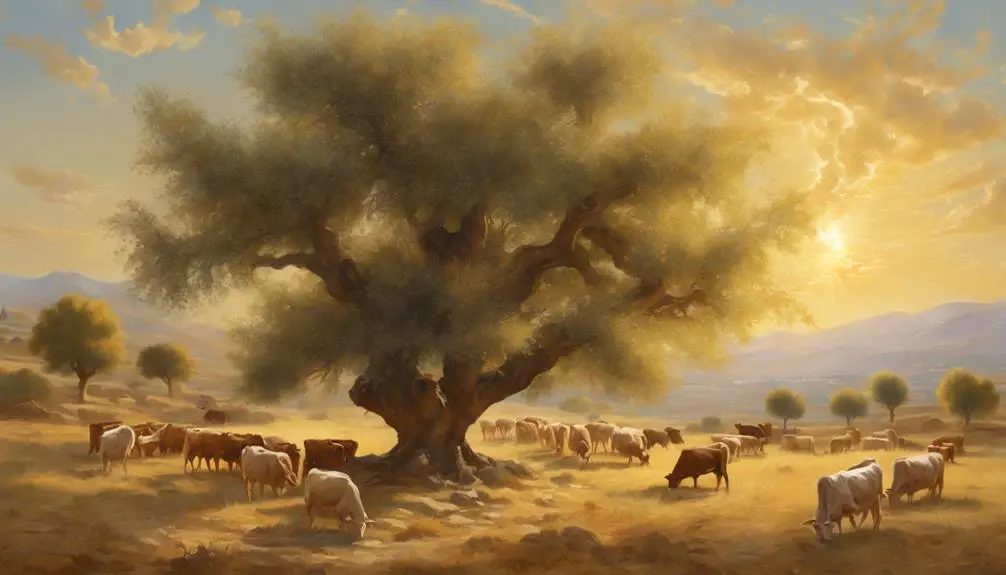
The symbolism of beeves in biblical texts reveals a complex layering of meanings that transcends their physical presence in ancient societies. As you delve deeper, you'll find that these cattle breeds weren't merely livestock; they were potent symbols of wealth, power, and divine favor. This symbolic significance is deeply embedded in the narratives and laws laid out in the scriptures, providing a vivid insight into the values and priorities of these ancient communities.
In examining the biblical symbolism, it's crucial to understand the specific qualities attributed to different cattle breeds. Some were prized for their strength and endurance, reflecting attributes highly valued in leaders and communities. Others were sought after for their fertility and milk production, symbolizing prosperity and divine blessing. This differentiation not only highlights the multifaceted roles of beeves in biblical society but also offers you a lens through which to view the socio-economic stratification and religious beliefs of the time.
Drawing modern parallels, the symbolism of beeves can still resonate today. In contemporary society, certain possessions or achievements often serve as modern 'beeves,' representing status, success, and favor. This parallel offers a fascinating perspective on how the symbolic value of possessions has evolved yet remains deeply rooted in human culture.
Beeves in Sacrificial Rituals
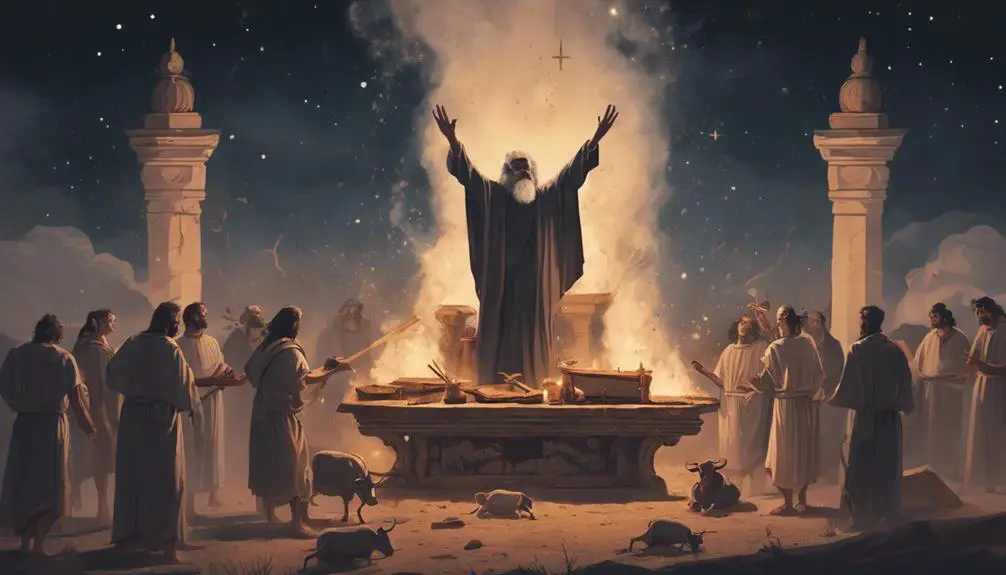
Reflecting on the symbolic significance of beeves reveals another layer of depth when considering their role in sacrificial rituals within biblical narratives. The practice of offering beeves, or cattle, as sacrifices is steeped in a rich tradition that not only highlights the spiritual importance of these animals but also underscores the cultural variations in how different societies approached the divine. In the biblical context, these sacrifices often symbolized atonement, gratitude, and covenant between the divine and humanity.
When you delve into the role of beeves in sacrificial rituals, several key aspects come to the forefront:
- Symbol of Wealth and Devotion: Offering a beef animal was a significant gesture, representing a considerable sacrifice of personal wealth and a profound act of devotion.
- Means of Atonement: Beeves were frequently used in rituals intended to atone for sins, acting as a conduit for purification and reconciliation with the divine.
- Cultural Variations: The specific practices and significance of beeves in sacrificial rituals varied widely across different cultures and periods, reflecting local traditions and beliefs.
- Communal Feasts: Post-sacrifice, the meat was often shared in communal feasts, fostering a sense of community and shared spirituality.
- Modern Interpretations: Contemporary scholars and theologians often explore the symbolic meanings of these rituals, offering insights into their relevance and adaptation in modern spiritual practices.
The intricacies of sacrificial rituals involving beeves in the biblical era provide a fascinating glimpse into the spiritual and societal values of ancient peoples, while modern interpretations continue to enrich our understanding of these practices.
Beeves and Wealth

In biblical times, beeves symbolized not only wealth but also the economic and social status of individuals and communities, underscoring their significance in both spiritual and worldly contexts. You'd find that beeves were more than mere animals; they were a tangible measure of prosperity and a crucial element in wealth accumulation.
Delving deeper, cattle trading emerges as a pivotal aspect of ancient economies, intricately linked with the concept of beeves. You see, engaging in cattle trading wasn't merely a transactional affair; it was a strategic endeavor aimed at increasing one's wealth and influence. The ownership of beeves, therefore, wasn't just about having resources for sacrificial rituals or personal consumption. It was about holding a key to economic growth and stability.
As you explore the biblical narratives, it becomes apparent how beeves played a dual role. On one hand, they were essential for fulfilling religious obligations, a point you've already encountered in discussions about sacrificial rituals. On the other hand, beeves represented a form of wealth that could be easily quantified and compared. In this light, the accumulation of beeves wasn't just about amassing wealth for wealth's sake. It was a means of securing one's standing within the community, ensuring not only economic but also social sustainability.
In this analytical exploration, it's clear that beeves transcended their immediate physical value. They were embedded within the fabric of societal wealth accumulation, symbolizing a complex interplay between economic assets and social standing. Through cattle trading and the strategic management of these assets, individuals and communities could navigate the challenges and opportunities of their time, illustrating the profound connection between beeves and wealth in biblical narratives.
Societal Implications
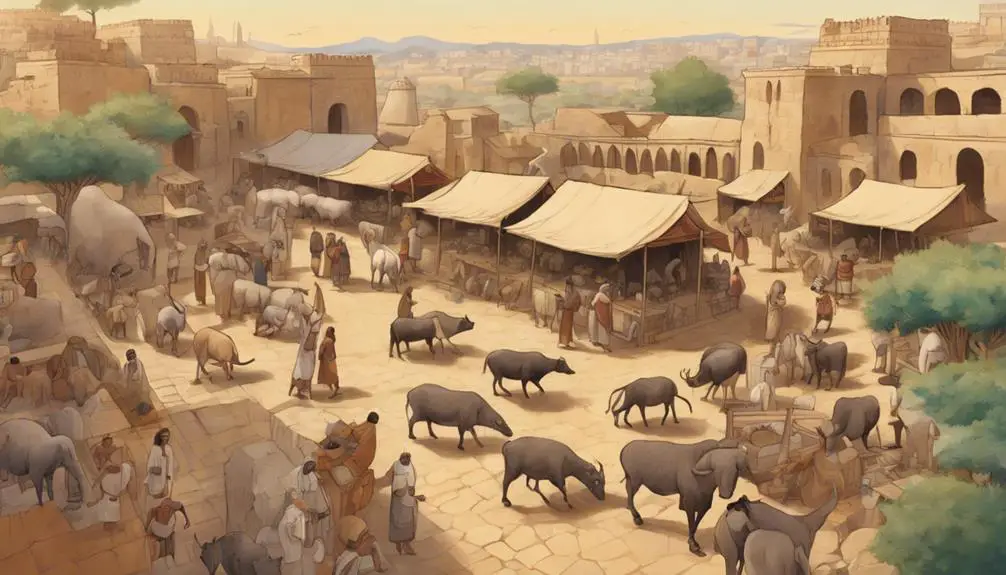
Understanding beeves' societal implications requires examining how their ownership impacted community dynamics and individual social statuses within biblical societies. The presence and management of beeves played a significant role in the cultural evolution of these communities, influencing everything from dietary laws to social hierarchies. Your grasp of beeves' importance extends beyond their immediate utility to their broader societal functions.
- Cultural Evolution: Beeves were central to the agricultural and economic development of biblical societies, driving technological advancements in farming and trade.
- Dietary Laws: The consumption of beeves was regulated by intricate dietary laws, reflecting their significance in daily life and religious practices.
- Social Hierarchy: Ownership of beeves often indicated wealth and status, contributing to a stratified society where one's standing could be measured by their livestock.
- Community Dynamics: Beeves necessitated communal efforts for care and protection, fostering cooperation and social cohesion among community members.
- Religious Significance: Sacrificial rituals involving beeves underscored their importance in connecting the community with the divine, reinforcing societal norms and values.
These points reveal how beeves were more than just animals; they were pivotal in shaping the social fabric of biblical societies. The intertwining of beeves with cultural evolution and dietary laws showcases their multifaceted role. As you delve into their significance, it becomes clear that understanding the societal implications of beeves offers a window into the complexities of life in biblical times, shedding light on how these communities navigated the challenges of their world.
Frequently Asked Questions
How Do Modern Translations of the Bible Interpret the Term "Beeves" Compared to Older Versions?
Modern translations of the Bible interpret 'beeves' through advanced translation methodologies and linguistic evolution, reflecting changes in language and understanding.
You'll find that older versions stick closely to traditional terms, whereas newer editions aim for clarity and accessibility, often replacing 'beeves' with more contemporary terms for cattle.
This shift showcases an analytical, scholarly approach, prioritizing context and the modern reader's comprehension over strict adherence to historical vernacular.
Are There Specific Dietary Laws Related to Beeves Mentioned in the Bible That Are Still Observed in Contemporary Religious Practices?
You're exploring how dietary laws regarding beeves mentioned in the Bible influence modern religious practices. These ancient texts lay out specific dietary restrictions that followers of certain faiths still adhere to.
Through careful analysis, it's clear that these commands aren't merely historical but deeply embedded in contemporary religious observances. Understanding the continuity and adaptation of these guidelines offers fascinating insights into the persistence of biblical dietary laws in today's context.
How Has the Depiction of Beeves in Biblical Art and Literature Evolved Over the Centuries?
You've noticed that the depiction of beeves in biblical art and literature has transformed significantly over centuries. Initially, artistic symbolism leaned heavily on literal interpretations, with beeves often represented for their direct biblical roles.
However, as you delve into medieval interpretations, you'll find a shift towards more allegorical uses, where beeves symbolize broader themes like sacrifice and providence. This evolution reflects changing societal values and the deepening of theological insights.
What Are the Environmental Impacts of Raising Beeves as Described in the Bible, and How Do They Compare to Modern Cattle Farming Practices?
You're exploring the environmental impact of raising cattle, both ancient and modern. Interestingly, an estimated 14.5% of global greenhouse gas emissions come from livestock.
Ancient practices, as inferred, emphasized climate resilience and genetic diversity more than today's industrial methods. This approach potentially offered better sustainability.
Modern cattle farming, while efficient, often lacks in these areas, leading to greater environmental challenges. Analyzing these differences sheds light on the importance of revisiting ancient wisdom for future practices.
Can You Find Any References or Parallels to the Concept of Beeves in Other Ancient Religious Texts Outside of the Bible?
You'll find that other ancient religious texts outside of the Bible also explore the concept of beeves, delving into animal symbolism and cross-cultural rituals. These texts frequently analyze the roles of cattle in various ceremonies, highlighting their importance in societal and religious contexts.
Conclusion
In conclusion, you've ventured through the historical corridors, unraveling the layers behind 'beeves' in the biblical context. From their pivotal role in sacrificial rituals to their embodiment of wealth, beeves have been a cornerstone.
Like threads interwoven in a tapestry, these elements—symbolism, wealth, and societal implications—merge, painting a vivid picture of ancient societies' intricacies.
Through this scholarly exploration, you've gained an analytical lens, viewing beeves not merely as animals but as profound symbols deeply rooted in biblical narratives and societal constructs.

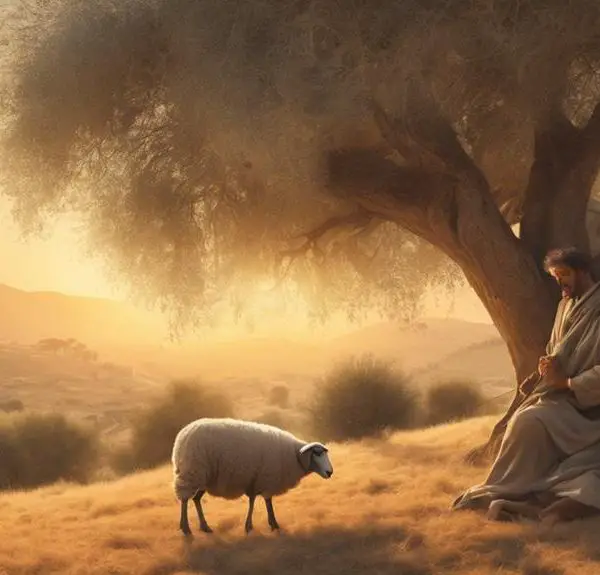

Sign up